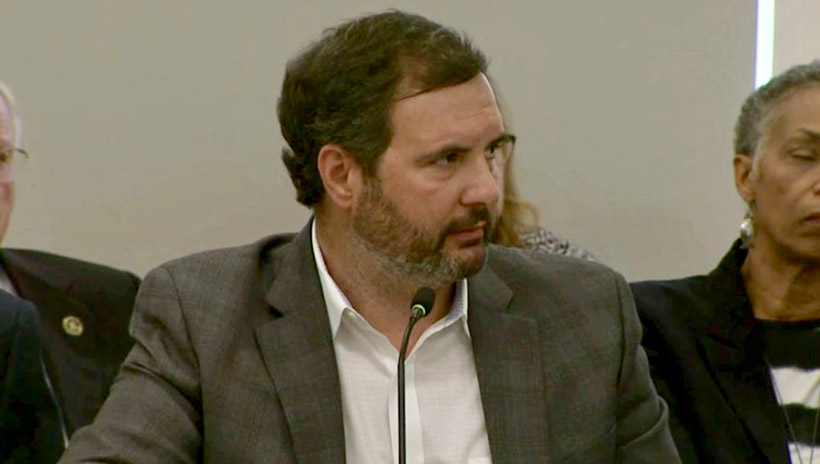Publisher's note: This post appears here courtesy of the Carolina Journal, and written by Lindsay Marchello.
Marty Kotis of the UNC Board of Governors in November 2018. | Photo: Kari Travis/Carolina Journal
Marty Kotis, a member of the University of North Carolina System's Board of Governors, for years has pushed for more online learning programs from UNC's college campuses. He hasn't gathered much support, but that may change now that the coronavirus pandemic is uprooting traditional higher education.
"I hate that this is what it takes for people to understand the importance of online learning, and also the threat of online education as a major disruptor," Kotis told Carolina Journal.
"But I think this fall that's exactly what we are going to see."
During its meeting Friday, March 20, the UNC board voted to table plans asking the General Assembly for more money to support operations and capital projects. The decision comes in light of the ever-changing situation posed by COVID-19. As the system's 17 schools move online to block coronavirus contagion, the board's budget and finance committee is developing a separate proposal for a legislative relief and online learning package.
UNC also announced it would allow schools to postpone commencement ceremonies. Students will still be able to graduate and receive their degrees. But a traditional ceremony isn't likely anytime soon.
Before the COVID-19 outbreak, UNC's primary concern was repairing and renovating its brick and mortar campuses. Those priorities should be reconsidered in light of the pandemic, said Kotis, a Greensboro real estate developer. Now is the time to press pause on old priorities and instead invest in online education, he said.
Universities are already pivoting to online courses to slow the spread of COVID-19. But if a more robust platform isn't developed, UNC could lose students to other established online programs, Kotis argued.
Online, nonprofit colleges are on the rise, says an April 2018 report from
Inside Higher Ed. The article points to Western Governors University, which, to date, has a national enrollment of 112,000 students. WGU is climbing as one of the biggest contenders in the online space. The only other nonprofit to come close is Southern New Hampshire University, which has both a traditional campus and an online school. SNHU's online enrollment hit 93,000 last year. The two schools are eclipsing the for-profit University of Phoenix, which has dwindling enrollment, dropping below 100,000 students for the first time in 15 years, the report said.
Students and their families could end up going elsewhere to find something easier, faster, or cheaper in terms of online education. The UNC system must be prepared, Kotis said. An online class that's just a live broadcast on an app won't cut it.
"It's a tourniquet when you are bleeding, but it's not the right fix," Kotis said.
"The right fix is a robust online system where you are getting really close to the quality of on-campus learning and the ability to network and share and communicate with others online."
That's why he wants to table the budget requests and look at shifting investments from brick and mortar to online learning.
A
New York Times story published in late February discussed how public universities with large online programs are using technology to deliver more materials online. Georgia Tech is using Watson, the IBM-developed artificial-intelligence program, to create virtual tutors. SNHU is using AI for grading. Arizona State University monitors student performance with AI, warning academic advisers if students aren't keeping pace.
WGU and Boise State University enroll online students under a model unheard of in contemporary higher education: by subscription rather than semester. Students who finish course work faster pay less.
A move toward online learning is inevitable, said Jenna Robinson, president of the
James G. Martin Center for Academic Renewal.
"Universities should already be investing less in their brick and mortar assets," Robinson said.
"Starting in 2018, one-third of all students were taking at least one online course."
While she anticipates hiccups in transitioning to more online courses, Robinson thinks the trade offs will be worth it.
"The flexibility of online learning will outweigh some of the growing pains we're seeing right now," Robinson said.
Kotis sees an opportunity to build something out of the disruption caused by the viral outbreak, but others aren't comfortable abandoning long-term plans.
Some of these moves, such as postponing commencements, are premature, said Bob Rucho, a board member and former state legislator.
"Things are changing very fast, and a lot of things that may be today won't be the same or could be worse two weeks from now," Rucho said.
Students and families have been planning for commencement for a long time. Postponing commencement when it's still about six weeks out isn't the right step, Rucho said.
"No one knows for a fact about any of this stuff," Rucho told CJ.
The board should wait another two weeks before deciding whether to postpone commencement, Rucho said. These decisions should be based on fact - not speculation.
He disagreed with tabling the budget asks, too.
"Reality is, when the coronavirus ends - which it will do - what budget do we have to run the university?" Rucho asked.
It's important for the university system to send its budget requests before the legislature if they're to compete with other agencies looking for money, he said.
The board should have submitted what was in the vetoed budget and come with a supplemental ask dealing with coronavirus emergency funding, Rucho said. Gov. Roy Cooper vetoed the $24 billion budget June 28. Included in the budget was money for new capital projects and money for repairs and renovations of existing buildings.
Rucho said covering potential student refunds could be handled later.























